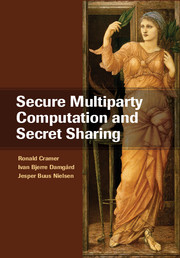Preface
Published online by Cambridge University Press: 05 August 2015
Summary
This is a book on information theoretically secure multiparty computation (MPC) and secret sharing and about the intimate and fascinating relationship between the two notions. We decided to write this book because we felt that a comprehensive treatment of unconditionally secure techniques for MPC was missing in the literature. In particular, because some of the first general protocols were found before appropriate definitions of security had crystallized, proofs of those basic solutions have been missing so far.
We present the basic feasibility results for unconditionally secure MPC from the late 1980s, generalizations to arbitrary access structures using linear secret sharing, and a selection of more recent techniques for efficiency improvements. We also present our own simplified variant of the Universally Composable (UC) framework in order to be able to give complete and modular proofs for the protocols we present.
We also present a general treatment of the theory of secret sharing, in particular, secret-sharing schemes with additional algebraic properties, which is also a subject missing in textbooks. One of the things we focus on is asymptotic results for multiplicative secret sharing, which has various interesting applications that we present in the MPC part.
Our ambition has been to create a book that will be of interest to both computer scientists and mathematicians and can be used for teaching at several different levels. We have therefore tried to make Parts I and II self-contained units, even if this implies some overlap between the parts. This means that there are several different ways to read this book; we give a few suggestions in the following paragraphs. In particular, the concept of secret sharing, of course, appears prominently in both parts. In Part I, on MPC, however, it is introduced only as a tool on a “need-to-know” basis. In Part II, we reintroduce the notion, but as a general concept that is interesting in its own right and with a comprehensive treatment of the mathematical background.
This book is intended to be self-contained enough to be read by advanced undergraduate students, and the authors have used large parts of the material in the book for teaching courses at this level. By covering a selection of more advanced material, the book can also be used for a graduate course.
How to Use This Book
For a course on the advanced undergrad level for computer science students, we recommend covering Chapters 1 through 5.
Information
- Type
- Chapter
- Information
- Secure Multiparty Computation and Secret Sharing , pp. ix - xPublisher: Cambridge University PressPrint publication year: 2015
